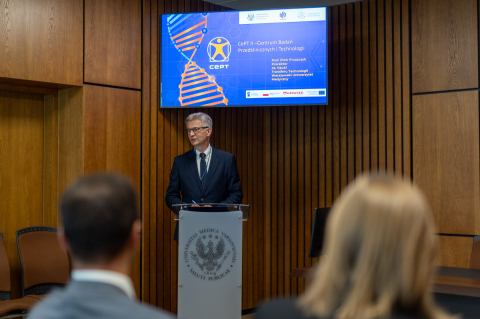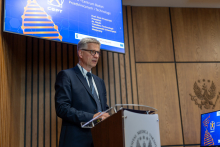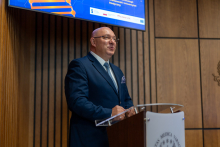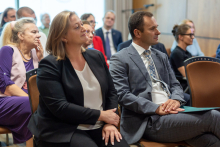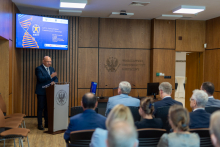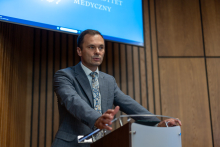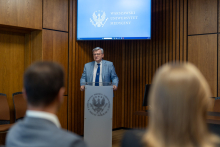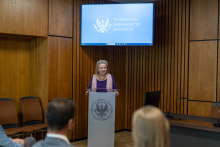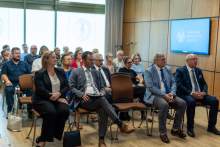The meeting, which took place on September 12 at the Library and Information Center MUW, was attended by Prof. Robert Gałązkowski, Acting Rector of MUW; Prof. Piotr Pruszczyk, Vice Rector for Science and Technology Transfer MUW, who acted as a coordinator in the CePT II Project from the side of our university; Marcin Wajda, Director of the Department of Regional Development and European Funds from the Office of the Marshal of the Mazowieckie Voivodeship and representatives of the Mazovian Unit for Implementation of EU Programs; Prof. Zygmunt Lalak, Vice Rector for Research at the University of Warsaw; Prof. Izabella Grzegory, Deputy Director for Scientific Affairs from the Institute of High Pressure Physics of the Polish Academy of Sciences; Prof. Paweł Włodarski, Vice Rector for International Relations, Development and Promotion MUW; Dr. Piotr Luliński, Dean of the Faculty of Pharmacy; Prof. Mariusz Gujski, Dean of the Faculty of Health Sciences; Prof. Tadeusz Grochowiecki, Vice Dean of the Faculty of Medicine. The meeting was also attended by representatives of the authorities of the institutions comprising the CePT Consortium, users of the infrastructure, and those responsible for the preparation, implementation and settlement of the CePT II project.
Prof. Piotr Pruszczyk, who chaired the event, summarized the process of the project’s implementation and spoke of its great importance, not only because of the scientific and research potential, but also because of the value of the cooperation undertaken and ongoing between the consortium members, very important for future projects planned by the consortium.
About the CePT II project
The CePT II project lasted from 2018-2024, and its value exceeded 43 million PLN. Funding for its implementation was awarded under the Regional Operational Program of the Mazovian Voivodeship for 2014-2020.
The research conducted under the project covered three thematic areas: regenerative medicine (Regenerative Medicine Laboratory MUW), nanomedicine (IWC PAN), and verification of innovative technologies through the use of mass spectrometry, isotopic techniques and 3D prototyping (UW). Thanks to the funding, state-of-the-art scientific and research infrastructure in the world was purchased for the laboratories that are part of the Regenerative Medicine Laboratory (headed by Prof. Magdalena Kucia).
Among the items received by the laboratory were: a flow cytometer, unique in the world, allowing the isolation of cells and nanoparticles from any biological material; a mass spectrometry system with revolutionary resolution, allowing the measurement of the concentration of any molecule, from a protein, drug derivative, cell fragment, etc.; a personal high-throughput sequencer allowing sequencing of up to 120Gb, while ensuring speed, ease of use and cost accessibility. The purchased equipment allows scientists to carry out the most technologically advanced research, including targeted therapies that will be implemented in MUW clinical hospitals in the future. It has also increased the laboratory's potential to provide services to businesses, strengthening cooperation between scientific units and industry.
